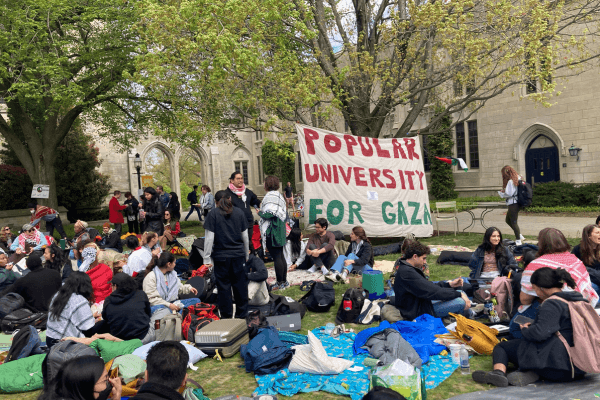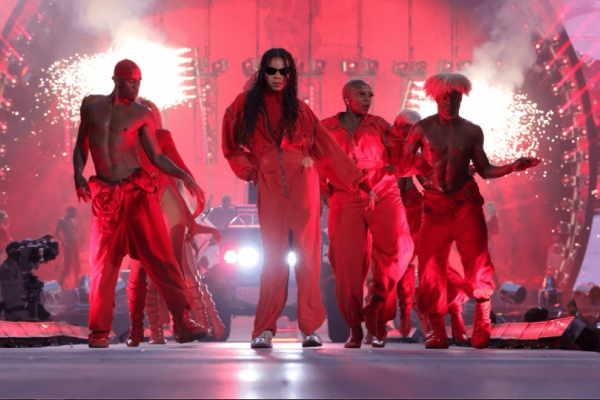Motherless Brooklyn, writer-director-star Edward Norton’s adaptation of Jonathan Lethem’s 1999 novel, is confident enough in its own scope to begin with Shakespeare, and it certainly backs up this confidence with an argument. A quotation from Measure for Measure invites us to reflect on the nature of power: “O! It is excellent to have a giant’s strength, but it is tyrannous to use it like a giant.”
Then we’re bang into New York City 1957, with private detective Frank Minna (Bruce Willis in a subtle performance as a generous man with a hard edge, or a hard man with a generous one) meeting some shady characters in a shadier room. Norton plays Lionel Essrog, one of Minna’s proteges, part of a crew who fought in the war, now running medium-level investigations under the wire. Lionel has Tourette syndrome, producing frequent verbal and physical tics; some people respond rudely — he gets called “Freakshow” by some so-called friends; some are respectful and compassionate; some don’t care about his Tourette’s, because they don’t care about him at all.
The first few minutes of Motherless Brooklyn provide one of the more enticing car chases in recent cinema, culminating in a genuinely shocking death. Like the whole movie, it’s brilliantly edited (to a fantastic score by Daniel Pemberton) — the drama and the pathos cutting into each other, sometimes flowing, sometimes crashing, as I imagine the experience of Tourette’s might be. A friend with Tourette’s tells me that the book is the most resonant depiction of the syndrome that he’s encountered; he’s more ambivalent about the film, respecting its sincere attempt, but critiquing the loss of nuance, such as its conception of Lionel as being granted special powers of memorization. He was moved, however, by the scene where Lionel, bereft, seeks the solace of his cat, but the cat is frightened off by an involuntary tic. But the audience at his screening laughed at this scene, deepening the frustration of Tourette’s being so regularly portrayed as the “funny” condition to the point that the accurate depiction of a painful moment is so readily interpreted as a throwaway joke.
So while the portrayal of Tourette’s is both intended as respectful and may leave something to be desired, Norton’s performance is extraordinary; his primary verbal tic is the tendency to exclaim If, a brilliant way of resetting the audience every few minutes. If — well that is the question, and the assertion. If New York City had been developed in favor of money only, and not people, what might we do about that? If there are men with access to the levers of astonishing power who care only about dominating others, can they be stopped? If what’s difficult is not knowing what’s right, but doing it, who’s going to go first?
The sprawl of the city is gorgeously evoked: the music (Michael Kenneth Williams pops up as a Miles Davis-like character, refusing to be diminished by white condescension, and finding an innovative use for a trumpet to resolve a violent threat), the city power structures (Alec Baldwin is elegantly on just the credible side of caricature as Moses Randolph, an urban planner who thinks he’s God — and whose behavior is loosely based on the power broker who shaped NYC in his own image), and the emergent civil rights movement (Cherry Jones as a peaceful warrior, Gugu Mbatha-Raw, gentle and mournful as a housing rights activist who has known too much pain at the hands of men who refuse their own responsibility).
The Shakespeare quotation looms over the film, as we see unfold a battle — sometimes of wits, sometimes of brawn — between those who use power for personal gain, and those who seek the common good. Motherless Brooklyn names the damage done by unaccountable power — by men who take what they want without thought of the consequences on others, whether from a human whose body they wish to possess or a city whose size they want to project onto themselves or even a nation they want to level. And then there are those, like Randolph, for whom the ego itself is the terrain — that to prevent something happening that would be good for everyone, including him, is a win, because it would require sharing, perhaps not even credit, but simple decency, with someone he hates. For Randolph, having power is the win. It matters less what he does with it (although what he does is important: His definition of power is basically the ability to turn nature into money. The legacy of his lust for taking what he wants is not limited to the climate crisis.)
It’s a virtue that Norton doesn’t “resolve” everything; there is no tidy ribbon tied round the old corrupt tree. Instead, he respects us enough to say that some struggles take a long time indeed, but there are moments in the struggle, and ways of struggling, that can offer their own victories. Baldwin’s tyrant and Willis’ adoptive shepherd who gets in too deep are two father-sides of a coin; the grace in this motherless town is in recognizing that there are bigger things than Brooklyn.
There’s an argument that suggests that the story of expulsion from the Garden of Eden was devised as a way of explaining the dysfunction of cities, of making sense of how we ended up in environments built without human flourishing in mind. Not that cities in and of themselves are the problem, but that a more integrated, whole, healthy, meaningful life requires paying attention to what might be called the rural parts of the spirit. We weren’t meant to spend so much time indoors, or in cars, or in front of screens — but more time with feet on the soil, breathing outside, touching and being touched by the obvious wonder of nature. To care about what we should really care about.
And that’s at heart of Motherless Brooklyn’s question, wrapped up in a marvelously compelling neo-noir framework: What should we really care about? What’s important enough to devote a life to? Is it preserving neighborhoods from gentrification, neighborhoods called slums by the politically powerful, which “just happen” to be lived in mostly by people of color? Is it finding out who’s responsible for causing the suffering in your life? Or is it the tender, often unremembered moments when someone truly saw you — when they saw your particular vulnerability, and told you that It’s OK. We’re OK. The culminating assertion in Motherless Brooklyn is that there are some things more important than winning, or at least winning in the short term, if true justice is what’s at stake. This movie, beautiful about ugly things, rich about poverty, angry about oppression, knows that there are times to not so much admit defeat, but take the kind of rest that reminds you who your friends really are.
Got something to say about what you're reading? We value your feedback!







